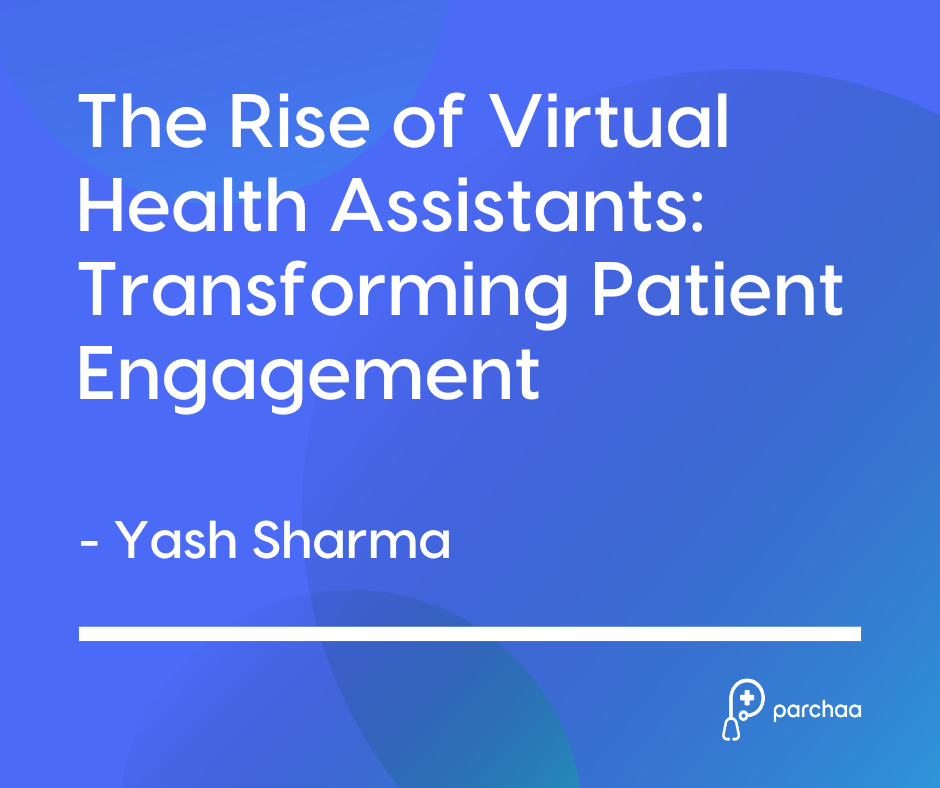Contact Us
If you have any questions, feedback, or need assistance, our dedicated support team is here to help.

The Rise of Virtual Health Assistants: Transforming Patient Engagement
Transforming healthcare with AI—Parchaa’s Virtual Health Assistants enhance patient engagement, access, and adherence like never before.

The Growing Demand for Enhanced Patient Engagement
Patient engagement is a critical determinant of health outcomes. Engaged patients are more likely to adhere to treatment plans, attend follow-up appointments, and manage chronic conditions effectively. However, traditional healthcare models often struggle to maintain continuous, personalized communication with patients, especially in resource-constrained settings.
AI-driven VHAs address this gap by providing scalable, round-the-clock support. They assist patients with appointment scheduling, medication reminders, symptom tracking, and health education, ensuring that patients remain informed and involved in their care journey.
How Virtual Health Assistants Are Transforming Patient Engagement
1. Personalized, Continuous Communication
VHAs leverage natural language processing and machine learning to offer personalized interactions. They can answer patient queries, provide tailored health information, and offer emotional support, all while learning from each interaction to improve future responses.
2. Improved Access to Care
By automating routine tasks and providing instant responses, VHAs reduce wait times and alleviate the burden on healthcare providers. This leads to more efficient use of resources and improved access to care for patients.
3. Enhanced Adherence to Treatment Plans
VHAs can send reminders for medication, monitor patient progress, and prompt timely follow-ups, thereby improving adherence to prescribed treatment regimens and reducing the risk of complications.
4. Empowerment Through Education
By delivering accurate, evidence-based health information, VHAs empower patients to make informed decisions about their health, fostering a sense of control and participation in their care.
Evidence of Impact
Studies have demonstrated the effectiveness of VHAs in various healthcare settings. For instance, a survey indicated that over 70% of patients reported satisfaction with their interactions with AI virtual assistants, highlighting their role in enhancing patient experience. Additionally, hospitals implementing VHAs have observed a 40% reduction in routine call volume, leading to decreased wait times and improved patient satisfaction.
Challenges and Ethical Considerations
While VHAs offer significant benefits, their implementation is not without challenges. Concerns regarding data privacy, the need for regulatory compliance, and the necessity for continuous updates to AI models are paramount. Moreover, ensuring that VHAs complement rather than replace human interaction is crucial to maintaining the empathetic aspect of healthcare.
At Parchaa, we address these challenges by adhering to stringent data protection standards, ensuring our VHAs are designed to work alongside healthcare professionals, and continuously refining our AI models to meet the evolving needs of patients and providers.
Parchaa’s Approach: Leading the Way in Patient Engagement
Parchaa, powered by PanScience, is at the forefront of integrating AI into healthcare. Our VHAs are designed with a deep understanding of the unique challenges faced by patients and providers. We focus on creating solutions that are not only technologically advanced but also contextually relevant and user-friendly.
Our platform offers:
- Multilingual Support: Catering to diverse populations by providing services in multiple languages.
- Seamless Integration: Easily integrating with existing healthcare systems to ensure smooth workflows.
- Data Security: Implementing robust security measures to protect patient information.
- Continuous Learning: Utilizing machine learning to adapt and improve interactions over time.
By focusing on these areas, Parchaa ensures that our VHAs are not just tools but partners in enhancing patient engagement and improving health outcomes.
Conclusion: A Future of Empowered Patients
The rise of Virtual Health Assistants marks a significant shift towards more patient-centered care. By providing personalized, continuous, and accessible support, VHAs are transforming how patients interact with healthcare systems. At Parchaa, we are committed to leading this transformation, ensuring that every patient has the tools and support they need to take charge of their health.
As we look to the future, the integration of AI in healthcare will continue to evolve, offering new opportunities to enhance patient engagement and improve outcomes. Embracing these technologies responsibly and ethically will be key to realizing their full potential.


